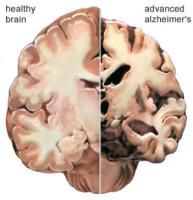Alzheimer’s Prevention Not As Important As Looking HOT!
The last time I saw my maternal grandfather, my Zadie, alive, he was mostly bedridden, in an institution for the aged in Springfield, Massachusetts.
He was 88 years old. He had long since retired from his profession of pawnbroking and about eight years before had been hauled in by the police since he was unable to locate the rented room where he desired to live alone, limiting his contact with his three daughters so that he could reassure himself he was not a burden. My mother worked frantically to convince him that she was indeed his daughter who lived in Boston. After a while, she finally elicited a smile from him.
“Boston. I have a daughter who lives there.” His inability to recognize my mother left her crying uncontrollably, despite my then meager (I think I had only recently become a doctor) attempts to explain to her what was then known about his brain disease, known as Alzheimer’s.
I never told her what was going on in my head. I figured out immediately that one fourth of my DNA came from this man, so I assumed that I was going to end up like that and that I was in very bad trouble.
I researched quickly and learned that the Alzheimer’s that folks researched and worried about was generally the type called “early onset”, about the fifties or so. Everyone else in my family seemed to have done amazingly well into advanced age, so I thought maybe I would be all right.
But I would absolutely not leave this one to chance. That was the time I started walking around with a bunch of supplements in my purse and lots more supplements in my apartment. I do not come from wealth and knew early on I would have to live by my wits.
Since I had been designated from earliest childhood as “gifted” and knew perfectly well I was one of the sharpest knives in the drawer, I have had a particular interest in intelligence, where it comes from, how it declines, and what you can do.
I remember reading about ways to articulate computers to brain cells or even how to use a hand-held computer as some sort of brain prosthesis. All of this presupposed that the creation of the histological lesion of “plaque” or “neuofibrillary tangle” was something inexorable that could not be stopped.
I knew all too well what how Alzheimer’s or cognitive loss of any sort was clinically diagnosed. Some bedside or office testing using means I had memorized, but mostly testing done by a psychologist. Long questionaires or interviews of relatives.
It is now generally acknowledged that Alzheimer’s or cognitive decline for age can be delayed and maybe even prevented. There is a long list of supplements that have been shown to be helpful. It is also possible to determine how likely a person is to develop Alzheimer’s with genetic testing. It is by no means 100% accurate, but it can give an idea of risk. No insurance company pays for it.
It is called “Apolipoprotein E” allele testing, and costs about $300 or $400. You can get it at any major University.
I have had a few patients who wanted me to “Alzheimer-proof” them, the way I have pretty much done with myself. Nobody has ever wanted to take the test. They do not want to know.
It may not take expensive testing to detect incipient Alzheimer’s. I remember learning, as part of the last generation to make it through medical school working in a hospital without the benefit of any kind of brain scanning (CAT scan was the first, available early in my residency) that the eyes were the window to the brain. Oh, how obsessively I would look at the retina, on the back of the eyeball, and see if a person had a little diabetic hemorrhage or maybe some high blood pressure.
If the status of the cells being observed really is a marker, this is a lot easier and cheaper than the genetic testing.
Still, I can only wonder if people will want to know? In the world of sales and marketing, prevention is the hardest thing in the world to sell.
In the world of sales and marketing, supplements that increase sexual prowess, or practically any human attribute, tend to sell before those that seem to increase a bit — let alone preserve — human intelligence.
I think these are general findings, although they are certainly reinforced by the fact that my life and work are centered in southern California, a rather amusing hotbed of anti-intellectualism.
 I think immediately of Billy Crystal’s brilliant portrayal of Fernando, the aging actor, who says “It’s better to look good than to feel good,” or even of the awesome level of glamour achieved by the aged Marlena Detrich.
I think immediately of Billy Crystal’s brilliant portrayal of Fernando, the aging actor, who says “It’s better to look good than to feel good,” or even of the awesome level of glamour achieved by the aged Marlena Detrich.
This is Southern California. Nobody loves an intellectual here.
Few people who have not dealt with severe cognitive loss understand its devastation and how important it is to avoid that devastation.
What good is looking good if you can’t even remember who everybody else is?
Filed under Alzheimer's Disease by on Apr 20th, 2010. ![]()

Leave a Comment